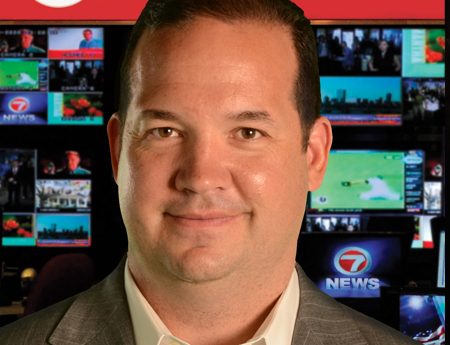‘Stay at Home’ Station Exec Bids Bye to Boston

The smarter way to stay on top of broadcasting and cable industry. Sign up below
You are now subscribed
Your newsletter sign-up was successful
A local television executive’s career typically involves hopscotching the nation for bigger gigs, each time uprooting the family, finding a new home, learning the local custom. That’s not been the case for Chris Wayland—until now. The Bostonian has spent his entire career in Massachusetts, including a long run as general manager of WHDH-WLVI, until his recent promotion to executive VP/ general manager of Sunbeam Television.
That means a move to Miami for the former professional hockey player and coach. “I love where I live, so there are some mixed emotions,” Wayland says. “I love winter, I love hockey, I look forward to the NHL season. We ski a lot as a family. I guess we’ll have to take up boating or something.”
Wayland is psyched for the opportunity, which came when Robert Leider retired. For Ed Ansin, Sunbeam owner, Wayland was an easy pick. “Chris is an excellent manager, he’s very intelligent, he knows the business and he knows the company,” says Ansin. “All of that made him an obvious choice.”
Ice, Ice Baby
Raised in Winthrop, Mass., (“Home of Mike Eruzione!” Wayland enthuses about the 1980 Olympics “Miracle on Ice” star), the Sunbeam chief took a shot at a career in the game. After playing at Elmira College in Western New York, where he describes himself as a risk-averse “stay at home” defenseman, he secured a spot with the minor league Nashville Knights.
It was a local TV connection that helped Wayland get to Nashville. His father Ron was head of the New England Broadcasting Association, and knew Dan Rea, a political reporter at WBZ. Rea dabbled in placing hockey players with pro teams, and helped Wayland land with the Knights in 1994.
His coach there was Nick Fotiu, a notorious tough guy during his NHL career with the Rangers. Fotiu says Wayland had NHL smarts and hustle. “He was a real hard worker and a nice, funny kid,” says Fotiu. “Chris had a good head on his shoulders, and always showed up ready to work.”
The smarter way to stay on top of broadcasting and cable industry. Sign up below
Wayland’s time in the rough and tumble league taught him a valuable lesson: He didn’t want to be broke anymore. Shifting to radio after a season, he sold airtime on Cape Cod, and joined WLVI two years later.
He later slid over to WHDH, but those hockey dreams die hard. Wayland talked his way into an assistant coach position with the Harvard squad in 2000. After one season, his future plans became clear. “I love to lead and teach and inspire people,” Wayland says. “I realized I could do all those things in the broadcast industry, and make a lot more money.”
Wayland was promoted to general sales manager at WHDH in 2007, and general manager a short while later. His coaching lessons greatly help with station management. “I try to hire as many passionate, dedicated, competitive people as possible,” he says. “I try to get them to operate at the highest level possible, and get them moving in the same direction.”
Boston is a brutally competitive market, where the TV outlets include network owned, a Hearst TV flagship and top notch cable channels dedicated to news and sports. A highly wired populace makes it that much harder to draw viewers to television, unless it’s the Red Sox. Wayland loves scanning the ratings each morning to see who won the previous day. He brings that competitive fire to Miami, where he oversees crackerjack Fox affiliate WSVN in addition to WHDH-WLVI.
“Somewhere in the world, someone is No. 1—the Alabama of TV stations,” he says of the elite college football program. “That’s my goal—to make us operate at the level that is the best in the country.”
Wayland’s family will eventually make its way to Miami too. His four daughters should have no problem adjusting to the sun, surf and sand of south Florida. “Four girls, and I’m sad to say, not one knows how to skate,” jokes their dad. “It’s really depressing.”
Michael Malone is content director at B+C and Multichannel News. He joined B+C in 2005 and has covered network programming, including entertainment, news and sports on broadcast, cable and streaming; and local broadcast television, including writing the "Local News Close-Up" market profiles. He also hosted the podcasts "Busted Pilot" and "Series Business." His journalism has also appeared in The New York Times, The L.A. Times, The Boston Globe and New York magazine.

